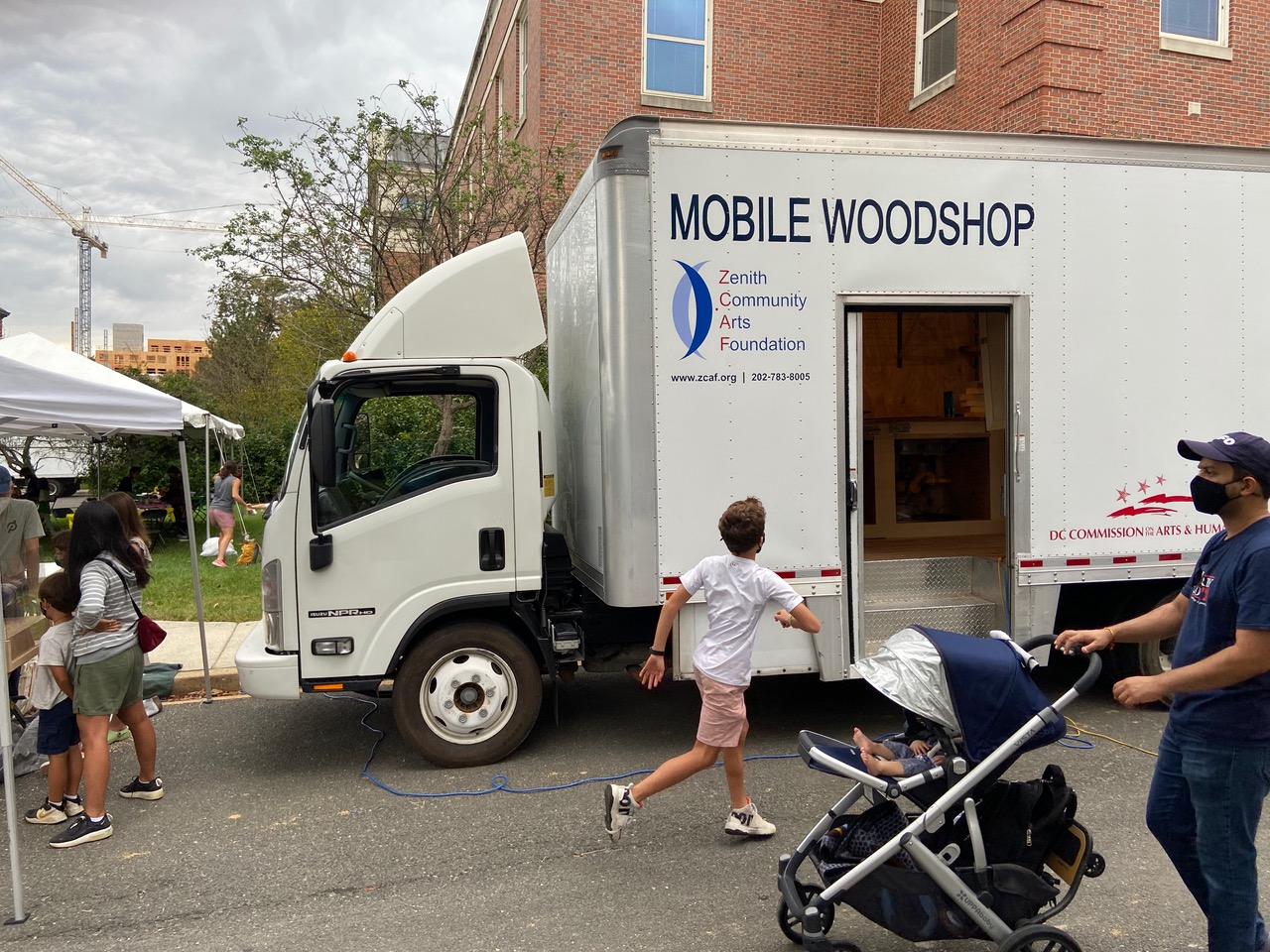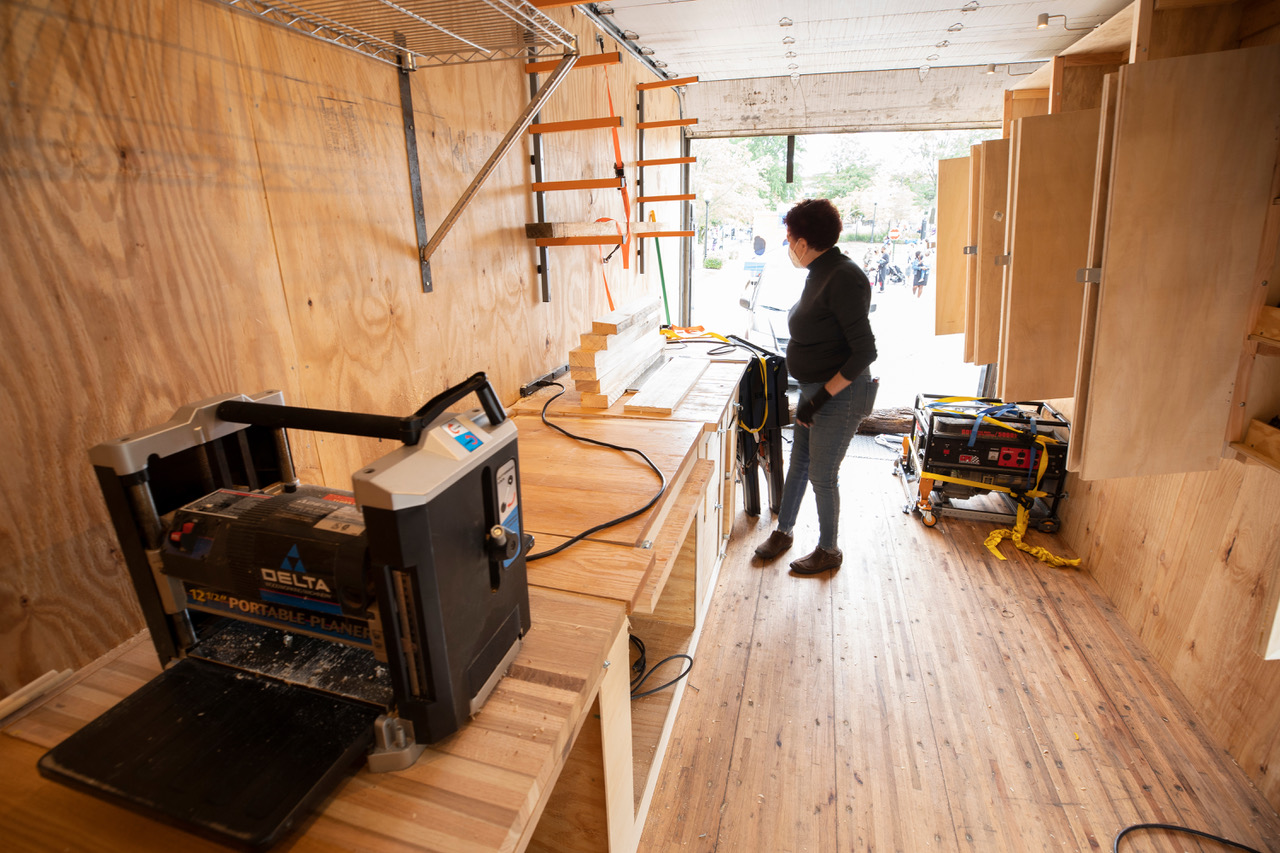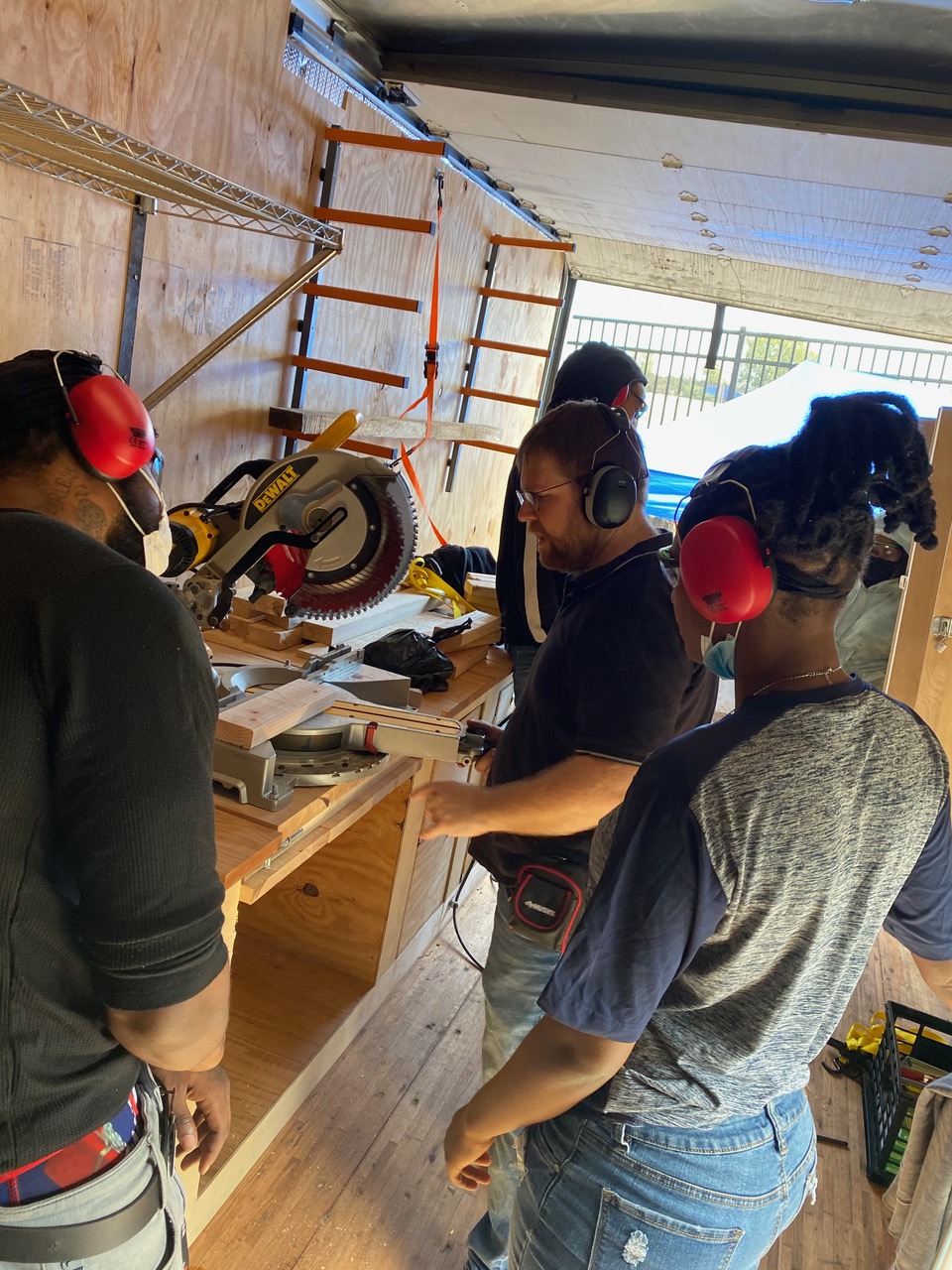Zenith Community Arts Foundation’s Mobile Woodshop Becomes a Reality
 In October 2020, I was hired as Project Coordinator of Zenith Community Arts Foundation (ZCAF) to implement the grants from DC Commission on the Arts and Humanities, Events DC, and Sam Rose Investments. With my background in woodworking and education, my immediate assignment was to acquire a truck with enough space for teaching DC residents carpentry and for transporting and storing tools and materials. By December, my extensive search ended with the purchase of a 20-foot Isuzu box truck that bypassed the need for a commercial driver’s license, diesel fuel, or familiarity with a manual transmission. For convenience and safety, it had a lift gate and a trailer with back and side doors. In the months that followed, ZCAF customized the interior with benches and tool cabinets so that at least four students and two instructors could function efficiently. Eventually a sturdy popup canopy was added to provide another 200 square feet of workspace.
In October 2020, I was hired as Project Coordinator of Zenith Community Arts Foundation (ZCAF) to implement the grants from DC Commission on the Arts and Humanities, Events DC, and Sam Rose Investments. With my background in woodworking and education, my immediate assignment was to acquire a truck with enough space for teaching DC residents carpentry and for transporting and storing tools and materials. By December, my extensive search ended with the purchase of a 20-foot Isuzu box truck that bypassed the need for a commercial driver’s license, diesel fuel, or familiarity with a manual transmission. For convenience and safety, it had a lift gate and a trailer with back and side doors. In the months that followed, ZCAF customized the interior with benches and tool cabinets so that at least four students and two instructors could function efficiently. Eventually a sturdy popup canopy was added to provide another 200 square feet of workspace.
Finding a Host Site for the Mobile Woodshop. Early on, ZCAF staff felt that Wards 7 and 8 demonstrated both a compelling need and an opportunity for skilled-job training for un- and underemployed young adults. Job loss from the pandemic has only exacerbated economic conditions. With largely African American populations, these wards also promised to be fertile ground for underserved young adults to enter the building trades.
Good fortune struck with an expression of interest from DC Public Schools, which steered us toward a partnership with the Opportunity Academy at Ballou STAY High School. A new facility in Ward 8, The Academy offered all the infrastructure the Mobile Woodshop required, plus a resident teacher who functioned as an observer/participant. Here was an educational structure tailor made for student learning and certification. In return, DCPS asked ZCAF to double its estimated enrollment from 8 to 16 and to pay students weekly stipends. Two tuition-free classes would run 5 days a week over the academic year. Startup began in September 2021.

Identifying Prospective Students. Once a host site was found, ZCAF developed publicity for its own Web site, as well as Ballou STAY’s. Included was a professionally videotaped interview with an African American union Council member (see this on Zenith Community Arts Foundation website). He also appeared at a jobs fair that ZCAF attended at the school. His story of rising from difficult circumstances to a six-figure position in the building trades has proven to be a powerful social marketing tool. Recruitment focused on men and women from 18 to 24 years of age already enrolled at Ballou STAY. (Publicity images reinforced outreach to women.) Some of the school’s student body came from other wards of the city.
School administrators took charge of student selection. Mobil Woodshop instructors were asked to conduct presentations to small groups of interested students. All applicants had high school diplomas. The vetting process yielded two classes of eight trainees each. Twenty-five percent were women.
Recruiting Instructors. Initially, I searched for seasoned African-American woodworking teachers through the local carpenters union, Washington Woodworkers Guild, and inner-city nonprofits like Wise Young Builders. Unfortunately, our grant covered only part time. The two African American instructors we wanted needed full time jobs with benefits. Ultimately, we hired two energetic millennial craftsmen with experience in teaching and a history of working together. One had run the woodshop in the University of Maryland’s Architecture Program. The other was an engineer with a part-time job constructing festival exhibits.
 Selecting a Curriculum. A successful carpentry program must not only impart essential technical skills and work habits, but also lead to certifications recognized in the building trades. The Eastern Atlantic States Regional Council of Carpenters has developed a comprehensive, step-by-step set of manuals that prepare high school students for certification and competitive paid apprenticeships after graduation. The Council provided multiple copies of Project Books 1 and 2 for our classes. Union officials also advised program staff about attracting qualified students. And it offered to supply guest speakers and arrange visits to active work sites. This partnership led to the creation of ZCAF’s Pre-Apprenticeship Carpentry Training initiative. Using ZCAF’s Mobile Woodshop, PACT aims to help prepare graduates for a variety of woodworking careers in residential and commercial carpentry, public works, and woodworking specialties.
Selecting a Curriculum. A successful carpentry program must not only impart essential technical skills and work habits, but also lead to certifications recognized in the building trades. The Eastern Atlantic States Regional Council of Carpenters has developed a comprehensive, step-by-step set of manuals that prepare high school students for certification and competitive paid apprenticeships after graduation. The Council provided multiple copies of Project Books 1 and 2 for our classes. Union officials also advised program staff about attracting qualified students. And it offered to supply guest speakers and arrange visits to active work sites. This partnership led to the creation of ZCAF’s Pre-Apprenticeship Carpentry Training initiative. Using ZCAF’s Mobile Woodshop, PACT aims to help prepare graduates for a variety of woodworking careers in residential and commercial carpentry, public works, and woodworking specialties.
Establishing Benchmarks and Performance Indicators. To ensure that PACT achieves its objectives, ZCAF is using a variety of incentives and evaluation measures over the school year and beyond. Project Books 1 and 2 call for frequent assessments of student proficiency in measuring stock dimensions, applying shop math, reading work drawings, developing cut lists, safely using hand and power tools, and completing projects to take home or donate to the community. Instructors also track soft skills like regular and prompt class attendance, teamwork, and willingness to follow directions and accept constructive criticism.
At the end of each semester, the instructors measure student success in demonstrating at least 70 percent competency for Level 1 or 2 of the Skill Matrix. Those who do will receive a union certificate that will enhance employability. In addition, $500 bonuses will be awarded to participants who have complied with program expectations for class participation. Finally, students will receive a separate certification for completing a 10-hour OSHA module on safety in the workplace. In turn, students will evaluate the curriculum and their instructors at least once a semester. Feedback will also address program facilities and logistics. These comments will allow ZCAF and Ballou STAY to make appropriate modifications to course content and structure. Most importantly, ZCAF will track PACT graduates to determine who found apprenticeships and/or jobs in carpentry, another form of woodworking, a different construction trade, or a position completely outside construction and fabrication.
Seeking Broader Community Engagement. Beyond the need for job training, ZCAF perceives opportunities to foster creative woodworking education for aspiring furniture makers, woodturners, model makers, sculptors, and do-it-yourselfers throughout the District. Potential instructors, including members of the Washington Woodworkers Guild and Washington Sculptors Group, have already expressed interest in participating. A search is underway to link such Community Engagement programs to promising host sites. ZCAF itself just completed a woodworking studio adjacent to Zenith Gallery that can house specialized classes. And the Mobile Woodshop has begun to visit festivals like Down at the Reeds (old Walter Reed Hospital), where 200 eager visitors from kids to grandparents got a chance to make something out of wood. In areas where creativity has few constructive outlets, our approach reaffirms the satisfaction of making something with one’s own hands.
Expanding the Mobile Woodshop Program. Several DC building associations have asked us to bring the Mobile Woodshop to their projects when they renovate homes in communities in need. Many jurisdictions have also invited us to bring the Mobile Woodshop to them to show them what is possible. We would certainly be excited to see a fleet of these woodshops on wheels crop up around the country.
Fundraising. ZCAF received grants from Events DC ($150,000), DC Commission on the Arts and Humanities ($81,000), Sam Rose Investments ($50,000). These funds covered initial planning and design, purchase of a truck, operational costs, and building of the stationary woodshop, where we will start teaching in 2022. Our wood is coming from DC trees and milled by DDOT and the Urban Forester, which is why we say on the truck Made in DC, Grown in DC.
For 2022 we have so far received funds from Jones Foundation ($25,000), DC Commission for the Arts and Humanities ($45,694), Sam Rose Investments ($25,000) and DCPS ($10,000). We continue to seek funds from individuals and organizations.
For more information about the Mobile Woodshop program, call Lynda Smith-Bugge at 703-201-4443.
